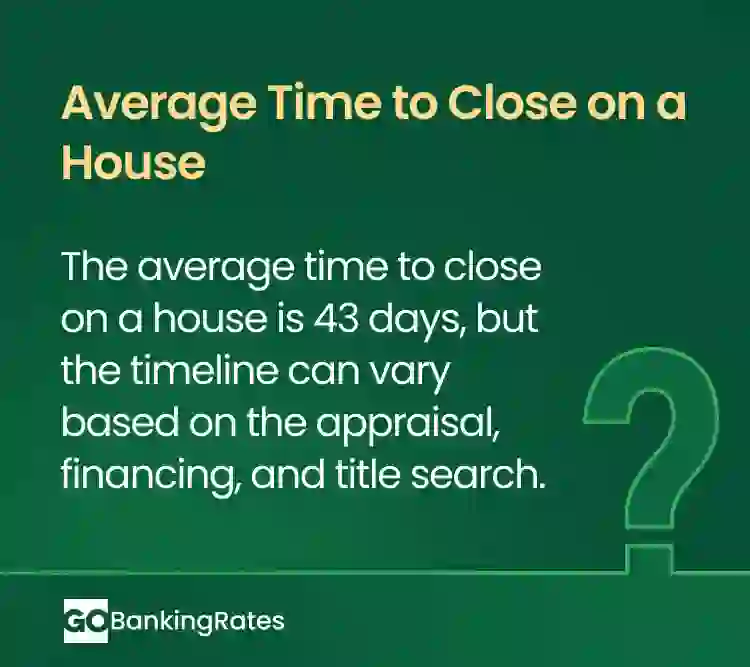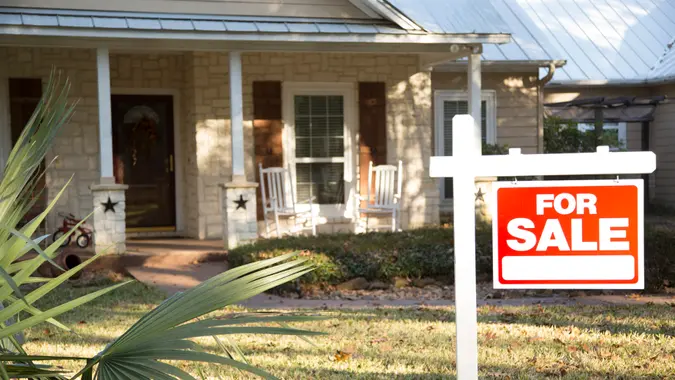How Long Does It Take To Close on a House?

Commitment to Our Readers
GOBankingRates' editorial team is committed to bringing you unbiased reviews and information. We use data-driven methodologies to evaluate financial products and services - our reviews and ratings are not influenced by advertisers. You can read more about our editorial guidelines and our products and services review methodology.

20 Years
Helping You Live Richer

Reviewed
by Experts

Trusted by
Millions of Readers
The process of buying a home has many moving parts, and most of the real work happens after you’ve signed the contract. According to ICE Mortgage Technology, the average time to close on a house is 43 days as of February 2025, which is the most recent data available.
Here’s a closer look at how long it takes to close on a house, factors that could cause delays and tips to expedite the process.
Understanding the Home Closing Process
Most buyers actually close two transactions on closing day. The first is for the home sale, and the second is for the mortgage loan. A lot has to happen before that day, and the clocks start ticking as soon as the buyer and seller sign the sales agreement. However, many preclosing tasks happen simultaneously, so you don’t have to wait for the completion of one before the next begins.
What Is Closing?
In real estate, closing is the final step in purchasing — and financing — a home. It’s sometimes called the “settlement” phase.
At closing, the buyer and anyone else directly involved in the transaction get together to go over and sign the paperwork required to finalize the homebuying process. Once done, you’ll assume full legal responsibility for the home. This means paying back the mortgage, property taxes, insurance and other related fees. The seller will receive proceeds from the sale at this time.
Key Steps in the Closing Process
To close on a house, you’ll need to do a few things:
- Get a home inspection: A third-party inspection can highlight any major issues with the home. This can help you decide whether to proceed with the purchase.
- Get an appraisal: An appraisal can determine the property value. It can also impact your interest rate, down payment and other factors. Most lenders require an appraisal.
- Do a title search: This will reveal who legally owns the property, and any liens or claims against it. Shop around for title service companies to find the best deal.
- Get insurance: Most lenders require homeowners insurance, but not all insurance companies offer the same coverage. Compare several quotes.
- Submit and review your documents: Review any final documents, like revised Loan Estimates or the Closing Disclosure, before closing. You may also request a promissory note or the Deed of Trust in advance.
- Finalize mortgage approval: At closing, you’ll sign legally binding documents and assume responsibility for the property and loan. Don’t hesitate to ask your real estate agent or attorney questions during this time.

National Averages
Here’s a breakdown of how long it typically takes to close on a house:
- Apply for a mortgage loan (as little as 1 day)
- Set up an escrow account (2 to 3 days)
- Order your inspection and request repairs (1 to 2 weeks)
- Wait for the loan underwriting process (5 to 20 days)
- Get an appraisal (1 to 2 weeks)
- Get a loan estimate (3 days)
- Receive conditional approval (varies)
- Get a title search (up to 2 weeks)
- Get homeowners insurance and title insurance (1 day)
- Clear to close (1 to 3 days)
- Attend closing (1 to 2 hours)
The typical closing duration on a house is 30 to 60 days. But it depends on a few factors, like the lender’s underwriting process.
Also, each state has its own Real Estate laws, which is why it helps to have a local real estate agent or attorney to help throughout the process. Some states require the buyer and seller to be present at closing, which could cause delays.
The loan type, market conditions, title issues and inspection results can also influence closing times.
Variations by Loan Type
Some types of home loans have their own closing times. Here are some of the most common loan types and average closing times:
- Conventional loans: It usually takes 43 days to close on a conventional loan. Closing times depend on the lender’s efficiency, inspection results and other factors.
- FHA loans: FHA loans may take longer to close on than conventional loans. This is largely because these loans must meet specific Federal Housing Administration (FHA) requirements. Closing times depend on the lender’s familiarity with this loan type.
- VA loans: VA loans must also meet certain federal requirements as set by the U.S. Department of Veteran Affairs. The typical closing time is 40 to 50 days, though some lenders offer quicker closing times.
Factors That Can Affect Your Closing Timeline
Even though it usually takes less than 2 months to close on a house, certain factors can affect your closing timeline. These include your financial readiness, property-specific issues and local market conditions.
Financial Preparedness
Being financially prepared is key to ensuring the homebuying process goes smoothly. During underwriting — which is the lender’s process for evaluating your credit and income to determine whether to approve or deny your mortgage application — the underwriter will look at the appraised value, which will help assess how much you can borrow. Then they’ll take a close look at your credit and finances.
The following are some of the factors the underwriter will use in their decision:
- Debt-to-income ratio: The underwriter will calculate your debt-to-income ratio by comparing your income to your proposed mortgage payment and to your total debt payments to make sure you can afford to repay the loan.
- Income: The underwriter will verify your income and employment history. They’ll be looking to verify that you have at least a two-year history at your current job or in your current line of work.
- Credit report: Your credit score is a factor in loan approval, but the underwriter will also look at your credit report to make sure your payment history meets its lending standards. The assumption is that your past credit history is a good indicator of how you’ll handle future credit, including the mortgage loan.
- Assets: Most loans require a down payment and closing costs, which usually amount to 2% to 5% of the loan amount. The underwriter looks at your assets, including bank and investment account balances, to make sure you have the funds needed to close.
You may also want to get a mortgage preapproval. This shows the seller that a lender is willing to lend you money — at least conditionally. You don’t have to go with a lender just because they preapprove you. But if you do choose the same lender, you’ll have a head start on the application because the lender already has some of your information.
Property-Specific Issues
If you’re having a home inspection (it’s always wise to, even if you don’t have an inspection contingency), contact a home inspector right away to schedule the appointment. The inspection itself only takes a couple of hours, and it might take the inspector several hours more to complete their report. But a busy inspector might not be able to come out right away.
If the home inspection reveals any major issues — such as health and safety hazards or problems with the electrical or plumbing — you can request repairs. Any required repairs can impact the homebuying process, but they can also save you unnecessary stress — and money — later.
Be aware that title complications can also impact the closing process.
The title search looks at a home’s chain of ownership to ensure that the seller has the right to sell the home and that no one except the seller has an interest in it. For example, if there’s a lien on the property, it’ll need to be released before ownership can be transferred from the seller to the buyer.
The title company that does the search also issues title insurance warranting that the title is clear. The title company will work on the search while the lender is underwriting your loan. An uncomplicated title search can be completed within a few days, but if the title company finds issues, it could take it a week or two to resolve them.
Market Conditions
Market conditions can also impact how fast you can close on a house. Consider the following:
- Seller’s market: There are more buyers than there are available homes. Closing times may be faster as a result.
- Buyer’s market: There are fewer buyers, but more available homes. This could potentially make for a longer closing process.
Other factors that can affect the closing timeline include:
- Local economic conditions (like unemployment rates and typical wages)
- Current interest rates
- Average housing prices in the area
- Population growth and decline
- State or local government policies (like property taxes and opportunities for new housing developments)
How to Speed Up the Closing Process
While you can’t control everything, certain parts of the closing process can be expedited.
Organize Your Documentation
Get your financial records together as soon as possible. Every lender is different, but Bank of America recommends having the following ready when you apply:
- Two most recent W-2 forms
- Pay stubs from the most recent 30 days
- Last 2 months’ worth of bank statements
- Two years’ worth of tax returns
- Fully executed sales contract
Your lender may request additional information or documentation during the underwriting process. Respond promptly to lender requests to avoid delays.
Choose Experienced Professionals
Choosing experienced professionals, especially those who’ve worked with buyers like you, can expedite the closing process. It helps to have a seasoned real estate agent as they can:
- Serve as an expert throughout the process
- Give you access to more homes through the Multiple Listing Service (MLS)
- Help with negotiations
- Clarify any real estate jargon
It’s also good to have a reputable lender. You can check a lender’s reputation on the Better Business Bureau (BBB). You can also verify that they’re licensed to lend in your area via the National Multistate Licensing System & Registry or your state’s financial regulation agency.
Cash Purchase
Typically, buying a home with cash speeds up the closing timeline. This is because you don’t have to deal with a lender.
But you’ll still need to wire money, which can take some time. You’ll also want to have a written contract that clearly identifies the property’s price and any conditions to close.
Note that buying a house with cash ties up your money in the property. This can make it harder to access the funds if needed for an emergency. You’ll also still have to pay for things like property taxes, insurance and possibly HOA fees.
Potential Delays and How to Avoid Them
A few things can cause delays, but you may be able to mitigate most of them.
Common Causes of Delays
Common causes for delays include:
- Appraisal issues: Lenders typically won’t lend more money than the property is worth. If you get a low appraisal, it means the property value is less than the previously agreed-upon purchase price. Appraisal issues make up roughly 5% of real estate transaction delays.
- Financing problems: Any complications with the lender can delay closing. According to the latest National Association of REALTORS® report, 24% of delays are due to financing issues.
- Unresolved contingencies: A contingency is a condition that must be met for the transaction to go through. If the contract’s contingencies aren’t met, it can delay closing. In some cases, the buyer or seller may even walk away from the transaction.
Note that underwriters sometimes issue a conditional approval, which means that they’ve approved the application pending resolution of certain issues. For example:
- If documents are missing, the underwriter might put your application on hold until you can submit them.
- If your new home is located farther away from your job than where you currently live, you might need to prove that you’ll be working remotely or will still be within commuting distance.
- If your recent bank statements show a large deposit other than salary, the underwriter might want proof of its source to make sure you didn’t borrow the funds or receive them in some other way that might jeopardize your mortgage application.
The time it takes for you to meet the conditions and for the underwriter to take the new information into consideration can add a week or two to underwriting, causing it to take a few weeks instead of a few days to a week.
Strategies to Mitigate Delays
The most common reasons for delayed closings are easy to prevent with a little advance preparation and diligence during and after underwriting.
- Have your income and tax documents on hand before you apply.
- Opt for a fully digital lending process. It’s much easier to upload documents and track your loan online than it is to rely on fax and phone calls for routine updates.
- Cooperate with your lender’s requests.
- Avoid opening new credit, closing current accounts and making large bank deposits and withdrawals.
- Review your closing disclosure carefully, and report any errors immediately.
- Verify that the funds needed to close are in your account.
- Do your final walk-through a couple of days before closing so you have time to work with the seller to resolve any issues.
- Be flexible with your schedule so you can attend any required meetings.
- Keep the lines of communication open with all parties.
If you’ve received a low appraisal, you may need to come up with more money, renegotiate the purchase price or walk away from the transaction.
Costs Associated with Closing
Closing costs are usually 2% to 5% of the home purchase price. The buyer is responsible for some of these costs, but so is the seller.
Typical Closing Costs
According to the CFPB, typical closing costs include:
- Appraisal fees
- Title insurance
- Tax service provider fees
- Government taxes
- Prepaid expenses (like homeowners insurance, interest and property taxes)
Who Pays What?
Typically, the buyer and seller will both pay closing fees. Here’s what buyers usually have to pay:
- Buyer’s real estate agent commission
- Loan origination fees
- Home inspection fees
- Appraisal fees
- Title insurance
- Credit report fees
- Loan discount fees or points (paid to get a lower interest rate)
- Escrow fees (may include homeowners insurance and property taxes)
- Deed recording fees
- Notary fees
- Land survey fees
- Prorated fees for property taxes or utilities
- Down payment
And here’s what the seller usually covers:
- Seller’s real estate agent commission
- Title insurance
- Property taxes
- Transfer taxes
In some cases, the seller may agree to pay some of the buyer’s closing fees — like loan origination, appraisal, inspection or HOA fees. These are called seller concessions. A seller can pay up to 3% to 6% of the total closing costs, depending on loan type.
FAQ
- Can I Close on a House Faster Than the Average Time?
- Yes, especially with an all-cash offer or by expediting inspections or appraisals. Getting preapproved with the same lender can also speed up closing times.
- What Happens If There's a Delay in Closing?
- Closing delays can be expensive. You could be required to pay additional interest (at a "per diem" rate). Interest rates may also increase, depending on the market. In some cases, the seller could choose to cancel the transaction. As the buyer, you could also lose any earnest money you've put down. Typically, you won't be reimbursed for already-paid closing costs.
- Are Closing Costs Negotiable?
- It may be possible to negotiate closing costs. In a buyer's market, for example, a seller looking to make a quick sale may be willing to pay certain buyer's closing costs. Discuss your options with your agent and lender.
Daria Uhlig contributed to the reporting of this article.
Our in-house research team and on-site financial experts work together to create content that’s accurate, impartial, and up to date. We fact-check every single statistic, quote and fact using trusted primary resources to make sure the information we provide is correct. You can learn more about GOBankingRates’ processes and standards in our editorial policy.
- National Association of Realtors "January 2025 REALTORS® CONFIDENCE INDEX SURVEY"
- National Association of Realtors "Seller Concessions: A Guide for REALTORS®"
- National Association of Realtors "Common Closing Costs for Buyers"
- The Mortgage Reports "Average Closing Costs 2025 | List of Closing Costs"
- North Carolina Housing Finance Agency "How to Handle a Low Appraisal"
- Bay Property Management Group "Who Pays Closing Costs: Buyers or Sellers?"
- National Association of Realtors "REALTORS® CONFIDENCE INDEX SURVEY January 2022"
- PLYLER, LONG & CORIGLIANO, LLP "How to Close a Cash Real Estate Transaction in Monroe, NC"
- CFPB "What fees or charges are paid when closing on a mortgage and who pays them?"
- CFPB "Is there any way I can check to see if the company or person I contact is permitted to make or broker mortgage loans?"
- Gulf Life Real Estate "Understanding the Factors That Impact Your Local Real Estate Market"
- National Association of Realtors "7 Reasons to Work With a REALTOR"
- Real Clear Settlement & Exchange "How Long Does It Usually Take To Go From Pending to Closing?"
- CFPB "Get a preapproval letter"
- USDA "Get Your Home Inspected"
- VA "VA Home Loan Guaranty Buyer's Guide"
- Griffin Funding "How Long Does It Take to Get a VA Loan?"
- Accounting Insights "How Long Does an FHA Loan Take to Close? Steps and Timeline"
- Rocket Mortgage "How Long Does It Take To Close On A House?"
- Mortgage Technology "Comprehensive real-time data at your fingertips"
- True Concept "How Long Does It Take to Get Title Insurance?"
- CFPB "Close the deal"
- CFPB "Shop for homeowner's insurance"
- CFPB "Schedule a home inspection"
- FDIC "Understanding Appraisals and Why They Matter"
- CFPB "What is a mortgage "closing?" What happens at the closing?"
 Written by
Written by  Edited by
Edited by 

























